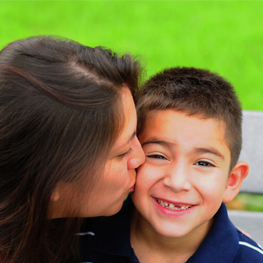
A few decades ago, parents eagerly waited for drop-off day at summer camp. For a few glorious weeks, they could happily ditch their roles of chauffeur, chef and chaperone. They’d read a few more books, have an extra glass of wine with dinner and simply enjoy a respite from the non-stop pace kids require.
Today, parents seem to have more difficulty ‘letting go.’ Thanks to new communication technology, we’re accustomed to being in constant contact with our kids. And our newsfeed can make the world seem like a pretty scary place for children. How can we trust that our kids will be protected and get their needs met unless we’re overseeing every detail of their lives?
But trust we must. In his book, Homesick and Happy, psychologist Michael Thompson concludes that children become more resilient, confident, competent and independent when they have opportunities to make decisions, solve problems and try new things out of their parent’s view. Overnight camp provides the perfect environment for such growth. “When you send a child off to camp, the gift you are giving him or her is to let go. You have to be willing… to let go of your importance in your child’s life to make space for someone else and new experiences,” says Thompson.
Kevin Gordon is owner and director of Camp Kupugani, and has many years of experience working with first-time campers and their parents. When deciding whether to send a child to overnight summer camp, Gordon says it’s a good idea to separate a child’s readiness from a parent’s readiness. “Sometimes well-meaning parents will also communicate that their child isn’t ready, but in fact, it’s the parent that’s not quite there,” he says.
Erec Hillis, former camper, counselor and now boys’ camp director at Camp Champions agrees, “It is our observation that 95 per cent of kids finishing second grade can be successful for a three-week camp term, but only 5 per cent of their parents think they can.” As a parent, memories of your child as baby, toddler and preschooler may skew your understanding of their current capabilities. You may think, ‘How could she have grown up so fast?’ Hillis suggests that parents begin to more accurately assess a child’s maturity by “taking note of things he or she can do now that weren’t so easy a year or two ago.”
Good preparation can also help you manage parental uneasiness. Taking the time to select the right camp is the first step. Is the camp director approachable and available? Do staff members undergo a rigorous hiring and training process? Does the camp provide exciting physical opportunities for kids, while also managing risks? If you can answer these questions in the affirmative, you can remind yourself as drop-off day approaches: ‘I’ve chosen a great camp. My child is in good hands, and they’ll get to try some really cool things.’
The next step is to prepare your child. Both Gordon and Hillis say it’s a good idea to have children spend a few nights away from home with friends or relatives. “When they can do this successfully, they can probably also make it at camp,” advises Hillis. In addition, some parents will find peace of mind in familiarizing their child with camp-necessary skills, such as sorting laundry, stowing toiletries and using a flashlight or headlamp. You can also acquaint yourself and your camper with the rules, daily schedule and layout of buildings by downloading information and watching camp videos.
Finally, it really helps for parents to make their own plans! Sign up for that hula-hooping class. Plan a tour of wine country. Or read 10 classic novels and get a new tattoo. “Just like your camper is trying new things and experiencing personal growth, you’re ready to do the same so you can be reenergized when he arrives home with great camp stories,” says Gordon.
Above all, express confidence in your child’s ability to succeed and have fun at camp. “Whatever you do, don’t project your uneasiness or anxiety on your child,” advises Hillis. If you have concerns about food, allergies or medical issues, speak with the staff ahead of time. Read the parent brochure and be prepared to follow the guidelines regarding communication with your child during the camp session. “When in doubt, call the camp,” suggests Hillis. “The directors are there to talk to you, answer questions and ease your concerns.”
Drop-off day is often bittersweet. You may need to hide a few tears behind your dark glasses. But as Gordon reminds us, “There are only limited camp years available for a child, so once the child is ready, it’s the parent’s job to get parent-ready.”
Before you know it, pick-up day will arrive. As you hug your tangle-haired, sodden-sneakered, somehow wiser child, you’ll think: ‘How could my child have grown up so fast?’ On the way home, the stories may bubble from their lips. Or the words may be few. But their eyes will tell you: ‘I’m different. I’ve found parts of myself I never knew existed. Thank you.’
Books and blogs
Campingly Yours by Thomas Adler
Free-Range Kids: Giving Our Kids the Freedom We Had Without Going Nuts with Worry by Lenore Skenazy
Homesick and Happy: How Time Away from Parents Can Help a Child Grow by Michael Thompson, Ph.D.
campkupugani.com/blog - “10 Questions to Help Determine Whether You’re Ready to Send Your Child to Camp” and “Encouraging Independence So Children Can Thrive (aka ‘Bringing Helicopter Parents in for a Safe Landing’)”
acacamps.org/blog/parents-place - “Preparing for Camp: Tips for Campers (and Parents!)” and “Ready for Camp?”
Ashley is a freelance writer living in the Pacific Northwest. She is contemplating the idea of overnight summer camp for her two sons next summer.
Calgary’s Child Magazine © 2024 Calgary’s Child